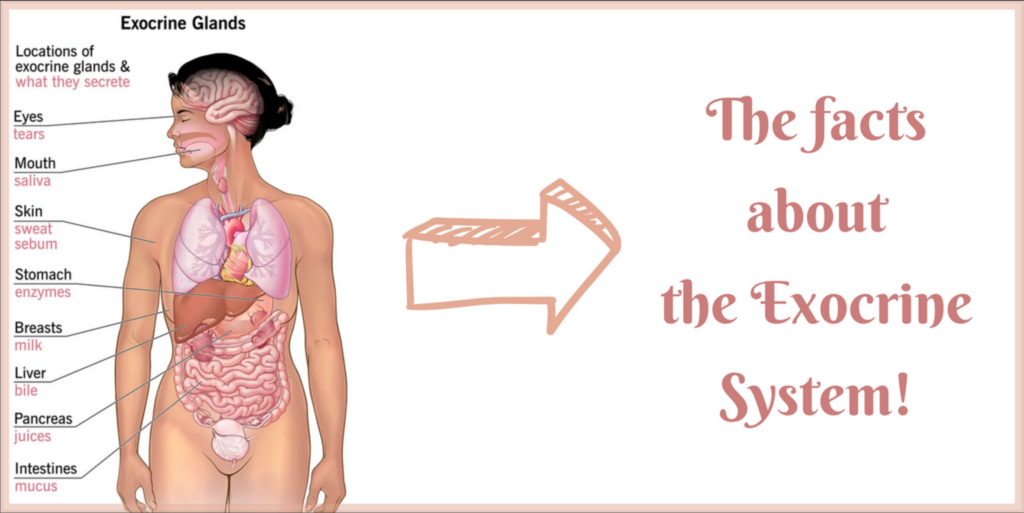Functions of the exocrine system
The functions of the exocrine system are adequately explained in this article. The exocrine system of your body is made up of glands that serve a variety of functions. It is a part of your autonomic nervous system that regulates uncontrollable behaviours that benefit your health.
Small organs, known as glands, produce substances that initiate specific biological processes. Your salivary glands, for example, produce saliva to keep your mouth moist.
What differentiates the endocrine and exocrine systems?
- Your endocrine glands carry out the task of manufacturing hormones and releasing them into your bloodstream. Following that, your bloodstream is in charge of delivering hormones to the appropriate tissues.
- Exocrine glands are in charge of secreting chemicals into ducts, which then transport those substances to the surface of target tissues.
Which parts of the body are aided by the secretions produced by the exocrine glands?
Exocrine glands are responsible for regulating particular tasks in your:
-
- The small intestine, aka duodenum.
- Skin and hair.
- Pancreas.
- Breasts.
- Mouth, specifically, saliva production.
What functions do the glands of the exocrine system perform?
Small Intestine: Mucosal glands, also known as Brunner’s glands, secrete a substance that serves as a barrier between the small intestine and the acid produced by the stomach. Furthermore, it stimulates the production of enzymes that are responsible for sugar digestion and nutrient absorption.
Skin and Hair: Producing oily substance is one of the functions of the exocrine system. The serous glands control perspiration. Sweat glands are classified into two types. Eccrine sweat glands can be found in almost every location on the surface of your skin. When you sweat, you stay cooler for longer due to the fatty substance secreted by apocrine sweat glands. Sebaceous glands are in charge of producing oil, which creates moisture which helps to protect the skin and hair.
Pancreas: The pancreas in your body performs both exocrine and endocrine functions. Because it is an exocrine gland, it secretes chemicals that reduce stomach acidity. It also secretes digestive enzymes, which are responsible for carbohydrate, lipid, and protein breakdown. Blood sugar levels are controlled by the hormones insulin and glucagon, both of which are secreted by the pancreas, an endocrine gland.
Mouth: Defending delicate tissue is included in the functions of the exocrine system. Mucinous glands generate the mucus to line and safeguard delicate tissue. Saliva is produced by glands called serous in many different parts of your mouth. Your saliva acts as a lubricant and a barrier to protect your mouth and throat. In addition to this, it kickstarts the digestive process by reducing carbohydrates to their component parts. In addition, your mouth contains glands that produce mucin, which lubricates the food and liquids that you take in through your oesophagus.
Breast: Producing milk is one of the functions of the exocrine system. Milk is produced by the mammary glands. The mammary glands, which are altered serous glands, support breastfeeding, also known as chestfeeding. They accomplish this by producing milk, which feeds infants and strengthens their immune systems.
The anatomy of the exocrine system
The following components make up the anatomy of exocrine system glands:
- Acinus refers to the minute sacs that store cells of exocrine system secretions that have not yet been discharged by the duct. Depending on the kind of secretion that the duct is in charge of producing, an acinus could contain a wide variety of cells of various sorts.
- A duct is a passageway throughout your body that carries cell secretions to the inner surfaces of organs.
Exocrine system ailments and disorders
Pancreas gland ailments
- Pancreatitis: When your pancreas gets irritated and inflamed, also known as swollen, you will have pancreatitis. This is not at all something that happens on a regular basis. There are several reasons for this, but the most common ones are heavy alcohol consumption and gallstones. Either way, a problem’s abrupt appearance or a problem’s prolonged existence could cause irreparable harm.
- Pancreatic cancer: Pancreatic cancer is typically not detected until it has progressed to an advanced stage due to its difficulty in diagnosis. Pancreatic cancer can be identified by two symptoms: jaundice and weight loss. Having diabetes and being exposed to certain chemicals are both risk factors. The form of care provided depends on the size of the tumour, its location, and the question of whether it has spread to other areas of the body.
- Other ailments include Salivary gland cancer, Breast cancer, Ear wax buildup and blockage, Hair loss (alopecia), Hyperhidrosis, Body odour (bromhidrosis), Hormonal acne, Rare, noncancerous tumours, including Brunner’s gland hamartoma and Brunner’s gland adenoma.
How to take care of my exocrine system?
You can accomplish this by:
- If you smoke, you should stop doing so.
- Lowering one’s overall alcohol consumption
- Consuming a significant amount of water at various points throughout the day.
- Consuming a diet high in protein, vegetables and fruits but low in processed foods and saturated fats.
- Maintaining a physically active lifestyle.
- Visiting your primary care physician regularly.
- Getting mammograms to inspect breast cancer is part of maintaining a regular screening schedule.



